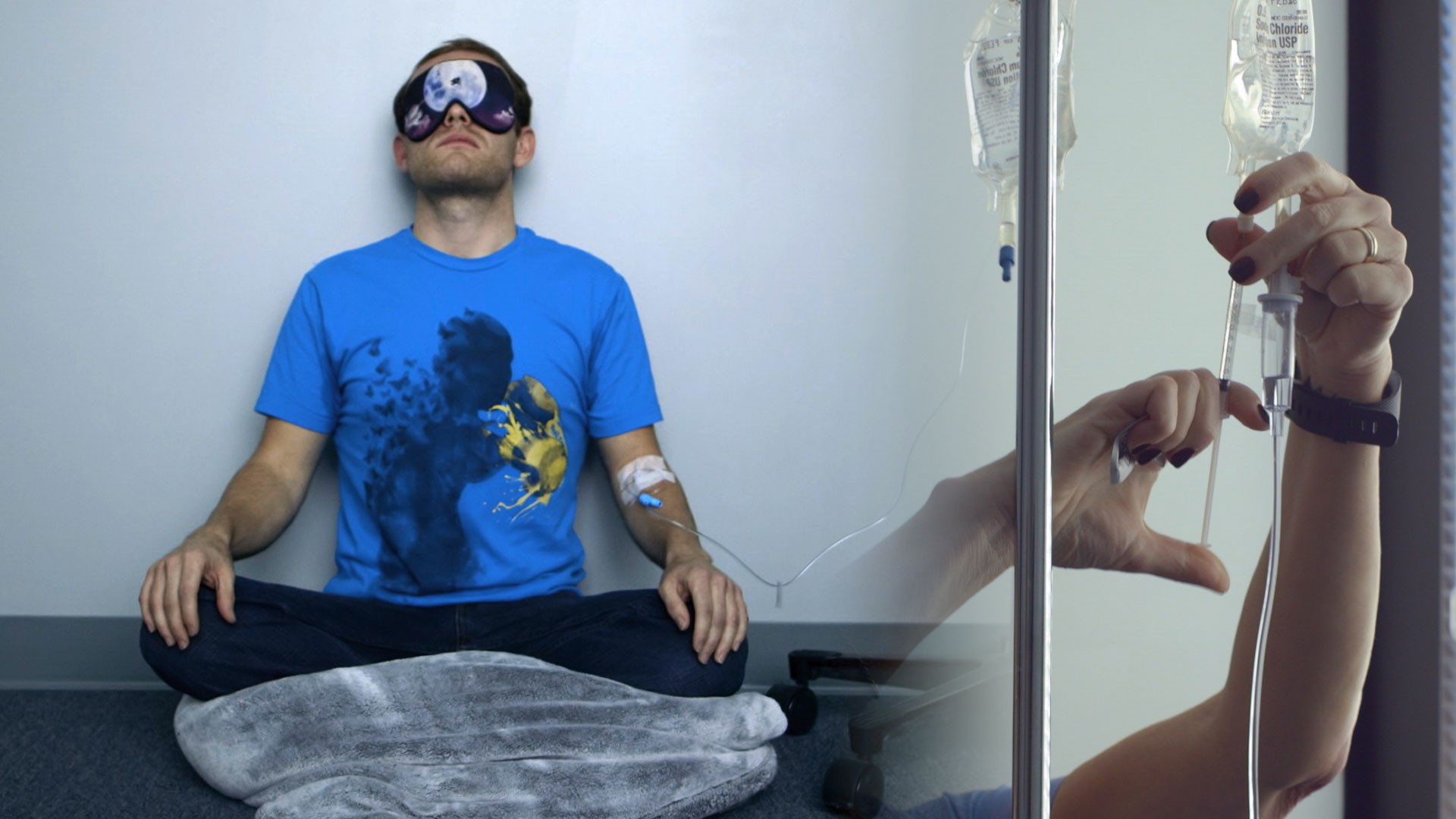German / Getty Images
Hit that like button if this sounds familiar: You climb into bed on a Tuesday and open Instagram to do some light pre-sleep double-tapping, when a Twitter notification from the New York Times lets you know Trump is once again up to some terrifying late-night shenanigans. So you spend a few minutes scrolling through the hot takes on your timeline—your ex has a particularly funny one—and what's he up to lately, anyway? Maybe you'll just check his Facebook real quick and oh shit is it 3 am already?
There's a whole body of research suggesting that we all might be a little overly attached to our phones. Last year, a study found that 39 percent of millennials engage with their smartphones more than they do with people. In another 2016 report, 50 percent of teens said they feel addicted to their devices. Every so often, research suggests that social media is making us feel anxious and inadequate. Or a publication poses a question like "is quitting social media the key to millennial happiness?"But if the thought of going off the grid has you feeling the emotional equivalent of the side-eye emoji, you should know that not every expert thinks you need to delete Snapchat like some kind of savage hermit.
"I would say cell phone use is only a problem if it's a problem," says Lily A. Brown, an assistant professor of psychology in psychiatry at the University of Pennsylvania Center for the Treatment and Study of Anxiety. She compares smartphone scrolling to drinking, eating, and even exercising—behaviors that are fine in moderation but can become problematic depending on the person.

Brown is sympathetic to the complicated and still-evolving role devices play in an increasingly digital world. Cutting out your data plan or keeping airplane mode on all the time isn't necessarily an option when phones are how we get news, weather updates and check in with the office. Plus, there's a lot of good to be said for social media in terms of staying connected with friends, family, and whatever community you align with. For some people, going online can help reduce negative emotions and even aid in managing depression and anxiety. The challenge, Brown explains, comes when people begin turning to social media in an effort to regulate negative thoughts, or to distract or disengage themselves from difficult emotions. "What we know about anxiety is: If you're engaging in any behavior in an effort to avoid anxiety, it's very likely that that behavior is going to temporarily reduce anxiety, and in the long term, increase anxiety," she says. And the tricky thing is that when the outcome of the actions changes—when the retweets aren't giving you that sweet, sweet dopamine rush they once were, or worse, you notice that your endless scrolling is making you feel bad—the pattern of behavior is so ingrained that it often continues. Habits—the category of behavior into which Brown says most phone use likely fits—are unfortunately and by definition some of the most challenging behaviors to change as they're practiced behaviors a person has done thousands and thousands of times. So let's say social channels are making you a little more anxious than usual, and you're thinking about cutting back. Here's the good news: No one's saying you have to stop following WeRateDogs.While Brown says the clinical research into habit reversal is "less robust" than other areas, an important first step is to create a heightened awareness of the fact that you're engaging in the action at all. "Let's say you catch yourself picking up the phone, and all the sudden you're on Snapchat or Facebook or Instagram, and you don't necessarily realize that you're on it until a few minutes in because it's become such a habit," she explains. (Guilty.) If your use has become so automatic that it's an almost reflexive response, just catching yourself in that cycle may help break the pattern.From there, you're going to have to practice a little self-awareness. (Sorry.) Brown calls it a "comprehensive assessment of the function of the behavior"—in other words, when you pick up the phone, what thoughts, emotions, and urges are you having in that moment? Is there something this action is doing for you in the short term? By slowing that process down and checking in with yourself, you can start to determine what, if anything, you're getting out of it. Take a look at the immediate and long-term emotional impacts of your constant liking and posting, and decide if it's worth it to decide to cut back. "It may or may not be," Brown notes, blessedly letting a good number of the Snap-obsessed off the hook.However, if it is making you anxious and you do decide to cut back, then you'll want to create manageable boundaries—no social media while you're eating meals, say, or on your subway ride to work—but there's no need to retreat to the woods. Brown says visual cues can be helpful here: maybe a silly sticker on your phone that you change out every week that reminds you to put down the device. Or even an unattractive, stodgy phone case that helps you associate the phone with a purposeful and quick transaction rather than leisure and fun.And as for whether quitting social media is the key to millennial happiness? Unlikely. Much like drinking and drug use, Brown says there are people for whom giving up the stuff cold-turkey just isn't effective and may actually be a bad idea. "Taking an abstinence-only approach to any kind of behavior change works really well for some people. For other people, it can be the kiss of death in terms of actually creating a sustainable plan."Read This Next: This Is How It Feels to Live with Severe Anxiety
Advertisement

Brown is sympathetic to the complicated and still-evolving role devices play in an increasingly digital world. Cutting out your data plan or keeping airplane mode on all the time isn't necessarily an option when phones are how we get news, weather updates and check in with the office. Plus, there's a lot of good to be said for social media in terms of staying connected with friends, family, and whatever community you align with. For some people, going online can help reduce negative emotions and even aid in managing depression and anxiety. The challenge, Brown explains, comes when people begin turning to social media in an effort to regulate negative thoughts, or to distract or disengage themselves from difficult emotions. "What we know about anxiety is: If you're engaging in any behavior in an effort to avoid anxiety, it's very likely that that behavior is going to temporarily reduce anxiety, and in the long term, increase anxiety," she says. And the tricky thing is that when the outcome of the actions changes—when the retweets aren't giving you that sweet, sweet dopamine rush they once were, or worse, you notice that your endless scrolling is making you feel bad—the pattern of behavior is so ingrained that it often continues. Habits—the category of behavior into which Brown says most phone use likely fits—are unfortunately and by definition some of the most challenging behaviors to change as they're practiced behaviors a person has done thousands and thousands of times. So let's say social channels are making you a little more anxious than usual, and you're thinking about cutting back. Here's the good news: No one's saying you have to stop following WeRateDogs.
Advertisement
